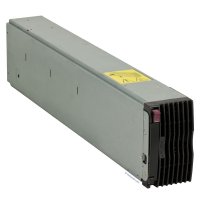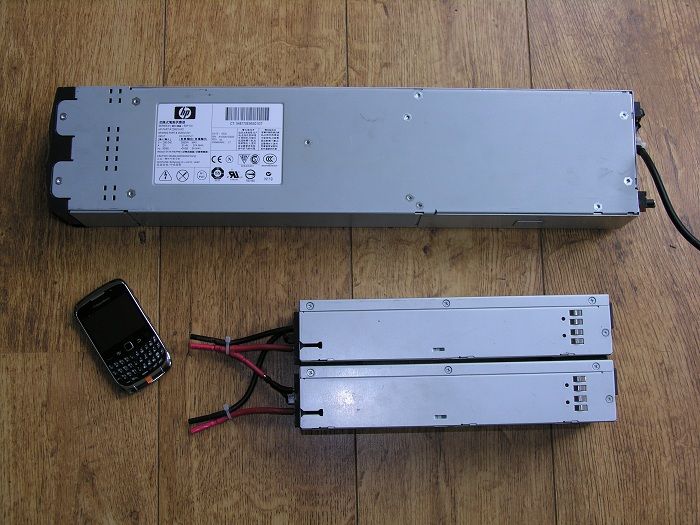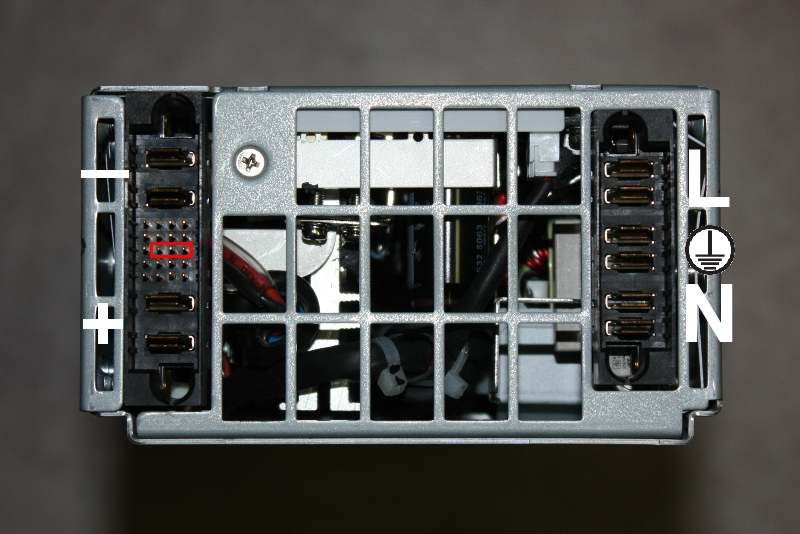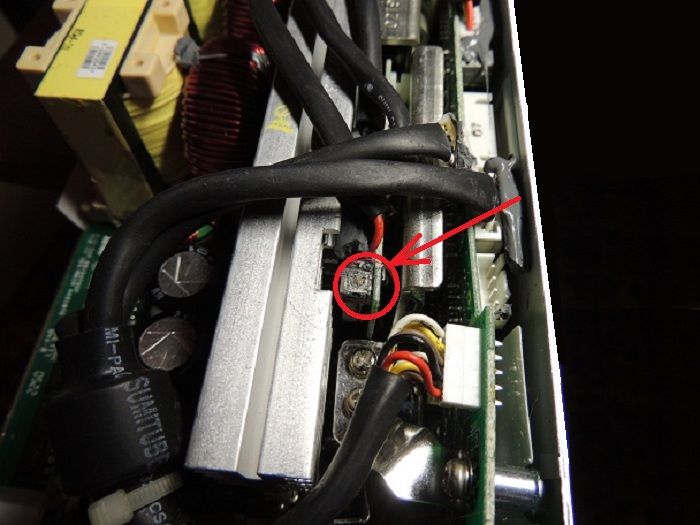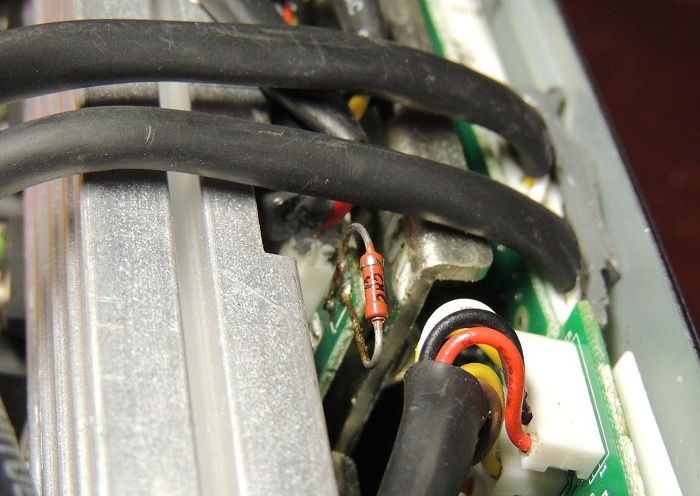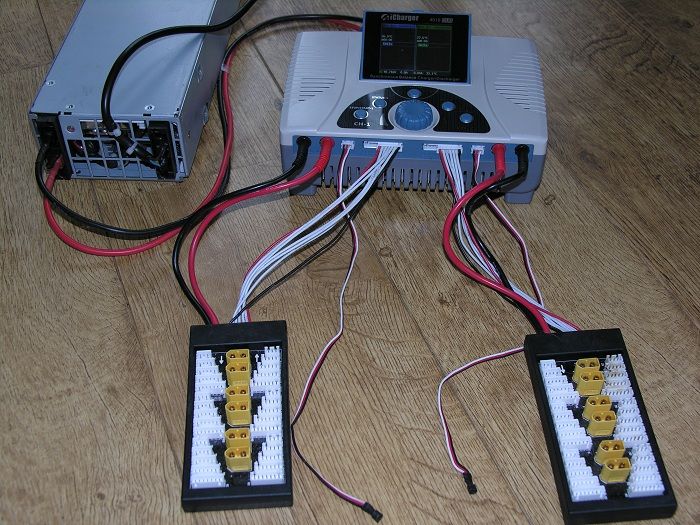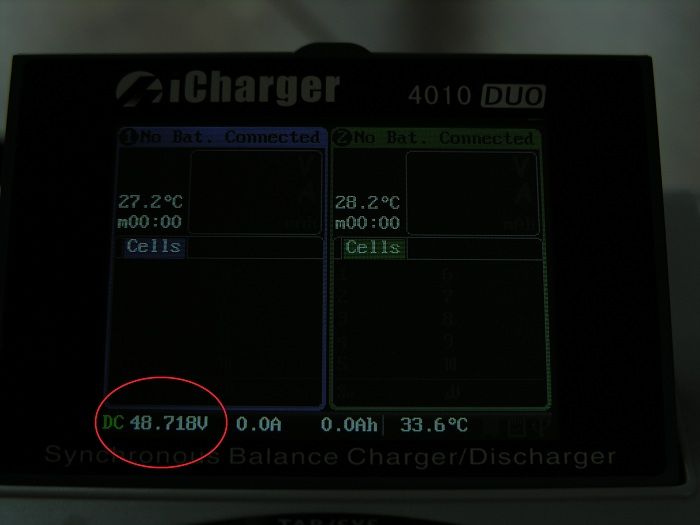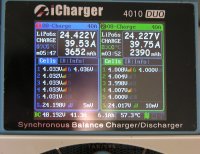Sorry this has taken an age to get around to. Truth is my old PSU was doing a good enough job until recently when I started flying large helis which meant large batteries. I was powering my 4010duo off my home made dual HP DPS-600PB 24v / 48Amp converted computer server power supply. For most charging duties this unit is a great option and is the same as being sold by the likes of 'Feathermerchant' and 'SolidHobby'. But all things have their limit and at about 1100W the dual DPS-600PB unit cant supply anywhere near enough power to max out the monster iCharger. What I also discovered is that a 24v PSU isn't ideal for charging 6s batteries because during the charge cycle the charger fluctuates between buck (voltage step down) and boost (voltage step-up). This fluctuation between modes can cause instability when charging at very high rates and can trip the charger.
What's really needed to get the most out of the big icharger is a PSU that will deliver at least 2200W at 36v to 50v. The high voltage not only allows the iCharger to reach it's maximum potential but makes for more stable operation as it will always be in voltage step-down mode. I could use four DPS-600PB coupled in series, but that would get messy and would require a fair bit of wiring spaghetti to couple them up. Luckily I found a computer server PSU that seemed to offer the solution in a single unit. This monster PSU is the HP ESP-120, the specs are as follows:
Voltage : 51.4V
Current: 57Amps
Power: 2950W
That's more power than five DPS-600PB PSU's:veryshocked:
I managed to find one on eBay that was dirt cheap (about $20). The only real problem seemed to be the voltage which was too high for the 50V limit of the iCharger. After searching on line I found some instructions on how to trim down the voltage, so it seemed i was good to go. Here is a quick overview of what needs doing to accomplish the conversion:
(Usual 'health warnings apply. High voltage electricity is potentially dangerous, you do this at your own risk, if you burn your house down or electrocute yourself don't come crying to me etc etc)
So here is the beast, ESP120 at the top and my old dual DPS-600PB unit below, mobile phone is for scale:
This PSU is intended to fit a rack mount type server so it has special quick connections at the AC input and DC output. Here is what you see looking on the end (image is marked up to show what the various connections do):
DC output is on left, AC input on right. The three small pins highlighted by the red box need to be shorted together to turn the unit on.
Here is how I soldered it all up. 3.5mm bullet connectors fit perfectly inbetween the DC output spade connectors. Great care needs to be taken with the AC input, the terminals need to be insulated to prevent shorting/electricution and the input cable needs to be anchored. The solution on the AC side isn't as pretty as it might be, but it works ok. A standard servo plug fits perfectly on the three small pins, just connect the servo wires together to short the pins.

The trickiest part is the modification to trim down the voltage. The PSU is fitted with a 700Ohm trimmer but this is not enough to get the output below 50v. Screwing the trimmer all the way gives 50.6V output which is still too high and causes an over-voltage error message on the icharger. To reduce voltage further you need a resistor with higher value. Either a trimmer or a fixed 2k2 or 2k7 resistor will get the voltage down around 48v. The original trimmer is surface mounted, you need to heat the base with a soldering iron and lift it off with tweezers or long nose pliers. It comes off quite easily once you get some heat in. Here is the trimmer:
It comes off leaving three solder pads. you need to put the new resistor between the two pads near the outer edge of the card, like this (borrowed photo):
After soldering on carefully check with a multimeter to make sure that the resistor is properly attached and that the two pads havent become bridged with solder. This is very important as the PSU could be damaged if the resistor isn't properly connected.
Pop the cover back on and that's all there is to it

Once you check that the PSU is running correctly and that the output is around 48v (48.7V in my case) then you can hook up your charger. Here's my charging set up:
And a shot of the icharger screen showing input voltage:
The complete conversion only too a couple of hours and I've got a PSU that's probably better in performance terms than even the mega bucks proprietary items that you can buy.
Steve
 ). What's more they can be had for very cheap prices on eBay, a little more than the old trusty DPS-600PB but still a bargain ($40-50 range). Being a computer server power supply they are designed to run reliably for many thousands of hours continuously, so even through they are used there should be plenty of life in them.
). What's more they can be had for very cheap prices on eBay, a little more than the old trusty DPS-600PB but still a bargain ($40-50 range). Being a computer server power supply they are designed to run reliably for many thousands of hours continuously, so even through they are used there should be plenty of life in them.